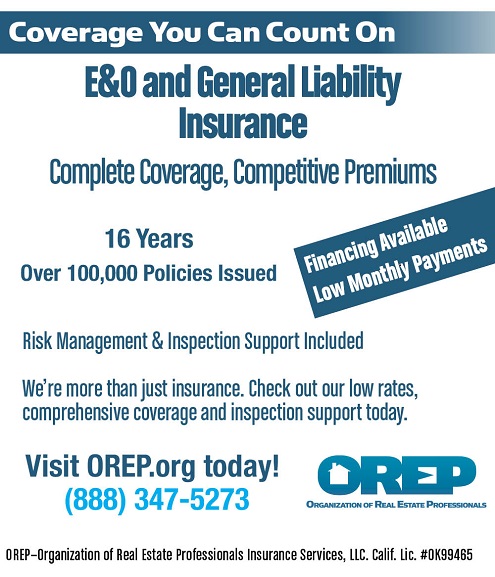 |
> E&O You Can Count On E&O/GL Insurance for Home Inspectors- *Broad Coverage *$1,000 minimum premium (choice of limits/deductibles) Shop OREP Now! |
Editor’s Note: This story appears in Working RE Home Inspector’s NEW January Print Edition. OREP E&O insureds receive guaranteed delivery of each print issue along with many other valuable business benefits.
> Now reaching 20,000+ Home Inspectors in Print and Online!
Building an Online Presence that’s Up to Code
By Kate Ivey, HomeGauge
Here’s the simple reason why every home inspector needs a website: according to Entrepreneur magazine, more than 80 percent of Americans say they do online research before making a purchase. This happens whether they got your name from a neighbor or a real estate professional or because they saw your logo on a vehicle. If you’re not putting your best face forward online, you might miss out on the large and ever-growing number of potential customers who rely on their online experience to make a decision.
The future success of every small business depends on building an online presence. This is especially true of the home inspection business, where more often than not, you don’t actually meet your customer until after you’re hired. Customers want to feel confident about hiring you. A great website is the best and most economical way to win their trust.
Don’t have a website? You’re not alone. In 2016, 46 percent of all small businesses still hadn’t made the leap online. But the latest numbers from Clutch, a Washington D.C.-based research firm, show that number is shrinking fast—from 46 percent to less than 30 percent in one year. As more business owners recognize the importance of a website for their customers, this number will go down even more. That said, now is the time to act so you don’t get left behind.
Have You Inspected Your Website Lately?
If you have a website for your home inspection business, congratulations! You’re a step ahead of some of your competition. But simply having a website isn’t enough; a website also needs to be functional and flexible. For example, more and more people are using mobile phones and devices to access the Internet. According to Entrepreneur, nearly a quarter of all small businesses say their website isn’t compatible with mobile platforms, meaning you’ve just lost a good bit of traffic from those devices.
A well-designed site draws a visitor in and is more likely to convert them than an outdated site that’s not mobile-friendly and where contact information is often hard to find. A successful website, built with today’s best design practices, easily guides the user through your company’s services, and offers multiple opportunities to contact via phone, email, or a contact form. You can even allow your customers to request an inspection directly from your website, increasing productivity for you and offering a valuable convenience for your customer.
Whether you’re building your first website or replacing your existing site, here are some key points you’ll want to keep in mind.
(story continues below)
(story continues)
Where Do I Start?
One of the first decisions you’ll want to make is which website building platform to use. There are various platforms available, but the most recommended is WordPress. WordPress is the most popular open source Content Management System (CMS) for websites worldwide. There are thousands of plugins and customizable themes available to enhance the look and functionality of each site, making it one of the most versatile platforms out there. In addition to written content, WordPress supports multimedia files so you can easily add images, videos, and audio files to your website.
Content Matters
Website content includes all text and media on your site, and it should be informative, relevant, interesting, and useful. It isn’t simply a matter of taking the sales pitch from a flyer or brochure and putting it on your website. Some of the best content doesn’t “sell” at all—at least not directly. Tips about quick fixes a homeowner can make or common problems you encounter are useful to a potential customer and help establish you as an expert in the inspection field.
Other effective content includes customer testimonials, information about your certifications or continuing education, and an explanation of your inspection services. This kind of content helps create an all-important relationship with a customer who will likely hire you before you actually meet in person. Content can come in the form of words, images (photos and illustrations or infographics) or video. Mix it up if you can—words, pictures, and videos of your work—and you’ll have a website that gets visitors to hang around. The longer they stay, the better your chance of getting the business.
One of the great things about websites is that, unlike flyers and brochures, which can require significant investments of time and money to change or update, website content can be easily updated at any time, and should be. Regularly adding fresh content to your website—new tips, updates about your business, news about home improvement, etc.—keeps your audience engaged and will boost your organic search results (how prominently your company appears when someone searches online for a home inspector) over time.
The content should be original, not copied from another source. In fact, simply duplicating content can negatively impact your search engine rankings and traffic to your site. That’s because when content appears in more than one place online, search engines can’t decide which is location is more relevant, so each link where the content lives has diluted visibility and link equity. It’s fine to draw from existing material, but turn it into original content by putting your unique spin on it, and then include an external link to the original source of the material that you’re referencing.
The other great thing about fresh content is that you can repurpose it. You may want to consider doing monthly specials, blogs, and newsletters, which you can then share on social media with a link back to your site for even more exposure. In the online world, the idea is to be as visible as possible.
What is SEO and Why Should You Care
Sometimes, prospective customers will search for you online by name. However, it’s more likely they’re conducting a search for “home inspector.” What can you do to improve where you show up on that generic search? The answer is Search Engine Optimization or SEO. You optimize your website for Google and other leading Internet search engines by understanding what potential customers are looking for and making sure your website tells the search engines you’re a great fit.
(story continues below)
(story continues)
One of the many advantages of WordPress websites is that they’re SEO friendly, meaning that they fulfill the parameters established by search engines to rank better in search results. There are also many free and paid SEO plugins you can install to further improve your website’s visibility.
There are many ways to improve your position in search results. Publishing fresh content to your website and then sharing the content on social media is one of them. A pattern of doing so encourages search engines to more frequently crawl your site, which can boost SEO and generate more traffic. Google wants to see that your site is alive and dynamic rather than stale and static. Most people mistakenly believe once they’ve launched a website that they’re good to go and their business will grow with little further attention online. This simply isn’t true. Staying active online will bring you more attention and a higher ranking, which go hand-in-hand.
SEO Best Practices
Common sense—and keeping your website fresh—go a long way when it comes to Search Engine Optimization. But if you’re the kind of person who wants to understand the fine points, you’ll find plenty of information out there. Two of the terms you’ll encounter are “Link Building” (when you link to other websites) and “Backlinks” (when other sites link back to your website). You’ll want to know how to monitor backlinks (and fix broken links), do outreach to industry leaders and influencers when possible, track your brand mentions, use Google AdWords, and so on.
It sounds complicated, but there are books and websites that can help. What’s that? You have enough to keep you busy already? No problem. If you’re too busy or SEO isn’t your thing, there are many experts you can hire to perform SEO services.
Social Media and Reviews
Social media is invaluable to your business and your website. Tools such as Facebook Ads can be used strategically to add value. It’s important that you both encourage and manage customer reviews. Respond to every review, good or bad, in a calm, professional manner. Sometimes how you deal with an unhappy customer says more about you than a rave review. But remember— social media isn’t a replacement for having a solid website. A post or a tweet alone probably won’t tell them what they need to know before hiring you to inspect their home.
Get Your Website up to Code
For most of your customers—who will never physically come to you—your website is your storefront. Like any storefront, your site should be clean, fresh, updated, and relevant. Your website showcases your brand and invites visitors to find out who you are and how you can help them. A responsive, beautifully designed, user-friendly website is one of the best investments a home inspector can make.
A website can extend your reach locally—and expand your market geographically. It can help you build a brand identity and educate your customers. It increases your visibility by putting you online where most customer are looking for a home inspector. Last but not least, it stays open even when you call it quits for the day or the week.
Many home inspection customers look for inspectors during their off-hours—in the evening after work and on weekends. By offering them a 24/7 quality online presence—a website that’s easy to find, easy to navigate, and populated with relevant information, you’ll be getting more calls, more emails, and more customers.
About the Author
Kate Ivey has been in the home inspection industry for more than 5 years and currently manages the web services team at HomeGauge. Kate and her team create custom websites and offer a variety of affordable hosting and SEO packages geared towards home inspectors. You can check out examples of their work at www.HomeGauge.com.
> Free Webinar:
Claims and Complaints: How to Stay Out of Trouble
Available Now
Presenter: David Brauner, Senior Insurance Broker OREP
David Brauner, Senior Broker at OREP, shares insights and advice gained over 20+ years of providing E&O insurance for inspectors, showing you how to protect yourself and your business. Watch Now!
Note: The September 2017 issue of Working RE Inspector mailed to over 20,000 home inspectors nationwide. OREP Insureds enjoy guaranteed delivery of each print magazine and many more benefits.




